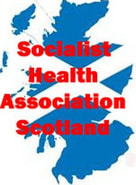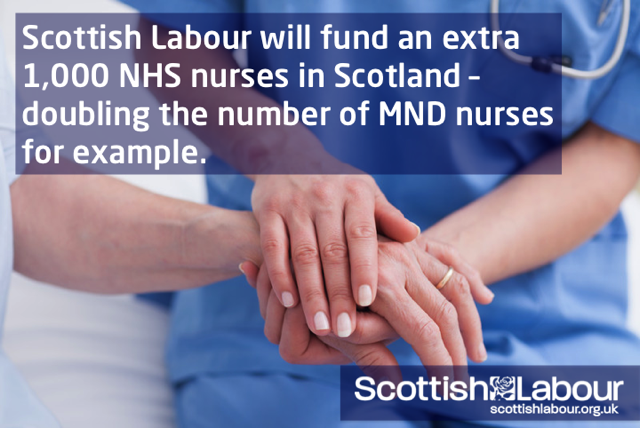Labour’s Deputy Leader Kezia Dugdale highlighted a number of these in her attack at FMQ’s last week. She said patients were being treated in a Portakabin at Glasgow’s Victoria Infirmary, treatment had been delayed at Ninewells Hospital, Dundee, and there had been 80 operations cancelled at Aberdeen Royal Infirmary including 15 that morning.
Labour has also highlighted a recent analysis by the Institute for Fiscal Studies which showed that Scotland has seen a 1% real-terms cut in NHS funding throughout the austerity period. This compares with a 4% increase under the Tories south of the Border. Jim Murphy told an audience in Edinburgh, “You cannot wrestle Scottish Labour’s mantle of the champions of the NHS when you are starving the NHS of funding more than even David Cameron would dare.”
A&E services have also been under the spotlight. Five of Scotland's health boards are seeing delays of at least three times the target A&E waiting times of four hours - and one health board recorded a wait of over 24 hours. NHS Greater Glasgow and Clyde said the longest wait between December 22 and January 6 was 25 hours. NHS Lanarkshire recorded a wait of 20 hours and 45 minutes at Wishaw General Hospital, and 17 hours 14 minutes at Hairmyres Hospital.
David Chung, vice-chair of the Scottish Board of the College of Emergency Medicine said pressure on casualty departments was "not sustainable". He highlighted an increase in elderly patients and the lack of any reserve capacity in the system. He said: "Scotland has got around 6000 less hospital beds than it did in 2005. Having a reduced number of beds has made it very difficult to cope with what in some ways was a predictable problem." Responding to critical incidents - such as a major car crash or flu outbreak - would be "challenging".
The Scottish Government’s response wasn’t helped when it emerged that an official had written to health boards advising them to stop providing journalists with information about their problems.
Professor Bell, President of the Royal College of Physicians of Edinburgh and previously clinical lead for the Scottish Government's Unscheduled Care Collaborative, said: "If you look at the historic trend data over the last five years it was likely that we would see this sort of pressure again. To me, it was predictable. Therefore, we need to develop far more robust and realistic plans that engage and support the workforce." He was also critical of simply blaming increased demand because programmes to coordinate a response this have been deteriorating since 2009.
Scottish Labour’s positive response to the pressures on the NHS has been a pledge to “support the NHS and nurses and use the money from a UK mansion tax to fund an additional 1,000 nurses in Scotland over and above the SNP plans that we inherit”. By deliberately referring to the fact that most of the mansion tax revenues would be raised in London, he drew fire from Boris Johnson and the Labour London mayoral hopefuls. Politically not unhelpful, given his strategy of positioning Scottish Labour as championing Scottish concerns.
While the politics are imaginative, the 1000 extra nurses policy is less credible. While no one would oppose extra nurses, staffing targets don’t have a good track record in Scotland and it is questionable if this is the main problem facing NHS Scotland.
Most observers would agree that it is bed blocking that needs to be addressed first. The number of patients who cannot go home from hospital because they are waiting for care packages to be put in place is a big part of the current problems. These patients are filling ward beds, leaving less room for the sick who need to come into hospital.
Patients ready for discharge now exceed the total beds available in the Southern General Hospital. As Professor Bell rightly observed, "We are cutting social care budgets at a time when we need to maintain people in their home environment... There is a perfect storm of reductions in social care funding and trying to transfer care from hospitals into the community. We need a co-ordinated plan."
Scottish Labour has been very effective in highlighting the pressures on NHS Scotland. Important politically as the NHS, particularly in England, will be a key issue in the forthcoming General Election. However, policy pledges need to be consulted over and thought through more carefully if the positive messages are to be credible.


 RSS Feed
RSS Feed